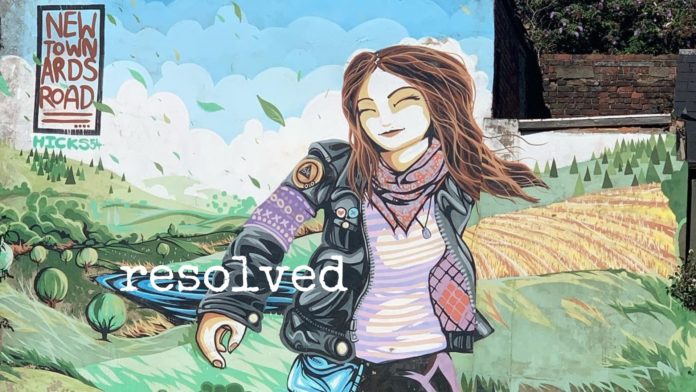Ireland is a lovely and complicated place, which, of course, means it shares much in common with the rest of the world though its story has often gotten more publicity over the years. A number of years ago, Gareth Higgins and Brian Ammons began doing Ireland Retreats from this vantage point:
The story we tell shapes the world we live in. The story of Ireland, north and south, is full of light and shadow, mystery and earthiness, sacred and profane collaborating to create a land of charm, beauty and inspiration. We invite you to take time out to experience the landscape, art, people and story that has captivated so many.
I am in the middle of one of the retreats. We have moved from four days in and around Belfast to a small coastal village between Belfast and Dublin called Kilkeel. The rhythm of our time has moved from long walks through urban neighborhoods to compelling stories from a variety of speakers to quiet time along the shore or in the middle of sheep pastures. We are here to listen, learn, and connect so that we might have a better sense of how we can make peace in our world, however big or small that world may be.
Gareth is in his late forties and grew up in Belfast. His life has been shaped by what people here call The Troubles. As we talked in one of the early sessions, he described the current situation in northern Ireland by saying the conflict has been “solved, but not resolved.”
The relation between the two words jumped out at me: solve and re-solve, as in to solve again. Perhaps, I scribbled in my notes, life is not an Agatha Christie mystery to be solved so we can move to the next case but a returning to keep resolving–coming back to the story over and over–to see what else we can learn.
The oldest roots of the word solve run all over the place, going back to the fourteenth century: to loosen, dissolve; untie, release, detach; depart; unlock; scatter; dismiss; accomplish, fulfill; explain; remove, It took a hundred years for us to begin to use the word to mean explain or answer, and then a couple hundred more before we thought about solving mathematical problems.
When I think of solving a mystery, the image in my mind is of wrapping things up rather than releasing or unlocking. I hear an expansiveness in the root of the word I had not thought of. When we think of solving a problem, it means we are done with it and can move on. We wrap it up, so to speak, when what the roots of the word tell is is that we actually set things free.
What, then, does it mean to resolve?
From some of our earliest language classes we learned that the prefix re- means to do again. It shows up, I would venture, as much as anything in our language, perhaps because life is mostly about doing things over and over.
Back to Gareth’s description of the situation in northern Ireland–it is solved, but not resolved–and the notion that to solve is to release (there’s that re- again), to resolve might mean to unlock or untie over and over, not as a means of wrapping things up or moving on, but as an understanding that resolving as daily practice is elemental to what it means to be fully human with and to one another.
To resolve means to scatter my presuppositions, my assumptions, my biases, so that I can free myself to find a deeper understanding of the world of which I am a small part. To be soluble means to be able to be dissolved, taken in, might we say included. To be a peacemaker, perhaps, is to be resoluble, or at least an agent of resolution, committed to connection and belonging.
Resolve, as a noun, means determination or focus, even as another meaning of the verb is to reduce to essential components. I have said before that life has a centrifugal force that flings us to the edges. We have to resolve ourselves: to pull ourselves together with determination and a sense that our connectedness matters most.
Solutions come together because the component parts belong together; resolutions are statements of communal intent, statements of communal identity. We are built for belonging, even as we often seem determined to live dividedly.
When I was in seminary, I took a French class while visions of doctoral work danced in my head. I don’t remember much of it, but I do remember one Beatitude in particular:
Heureux ceux qui répandent autour d’eux la paix,
car Dieu les reconnaîtra pour ses fils.
Blessed are those who spread peace around them,
for God will recognize them as God’s children.
May we daily resolve our lives–bring things together over and over, spread peace around us, so that we all might know we are wonderfully created in the image of God and worthy to be loved and to belong.
Peace,
Milton

Wow. This is such a thoughtful, eloquent piece. One of your best.
As a word nerd, I loved this! As a way into a deeper daily dpiritual practice, I was deeply moved to resolve to untie myself, to set not only myself but others free, to live more openly in the world.